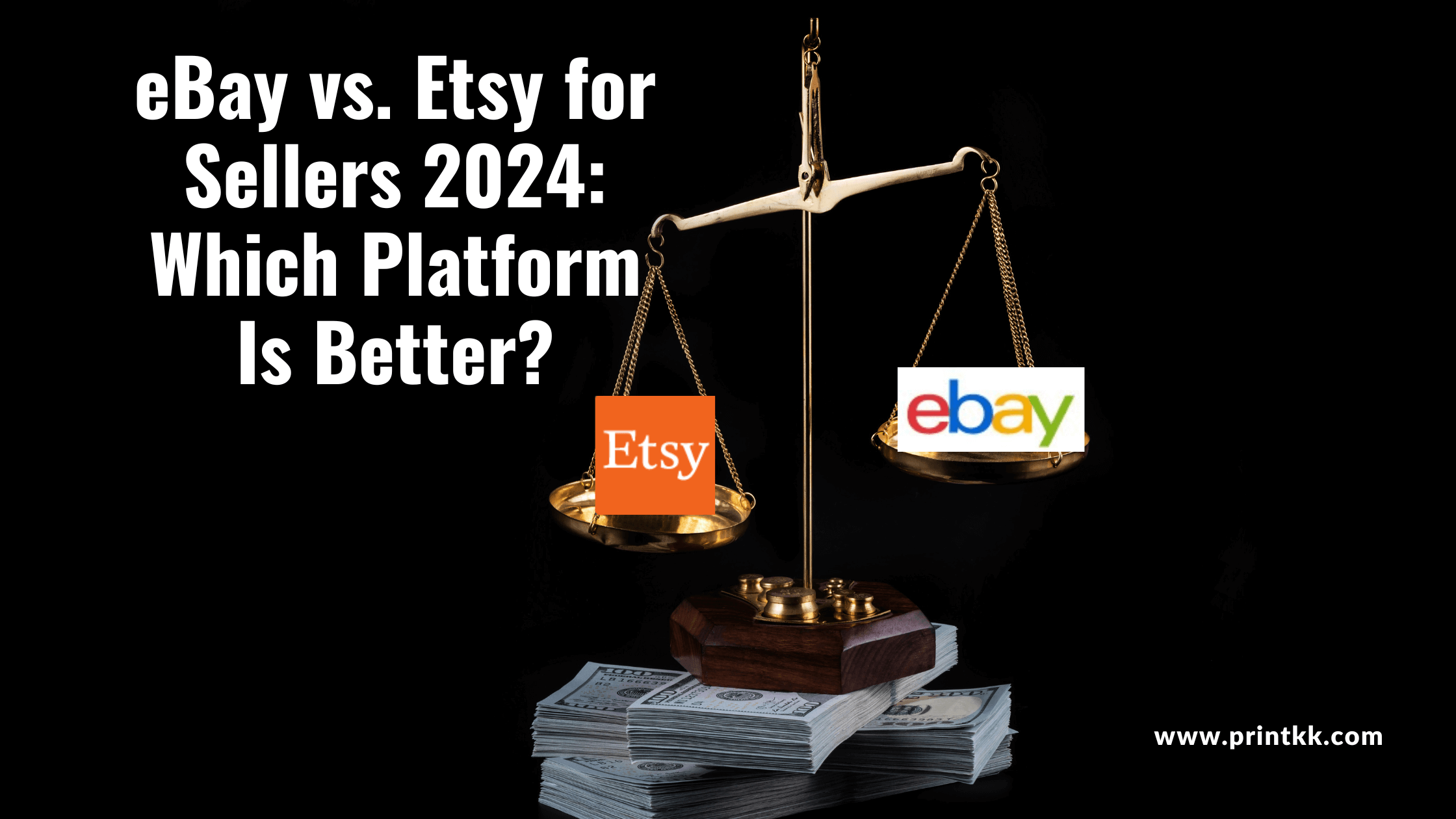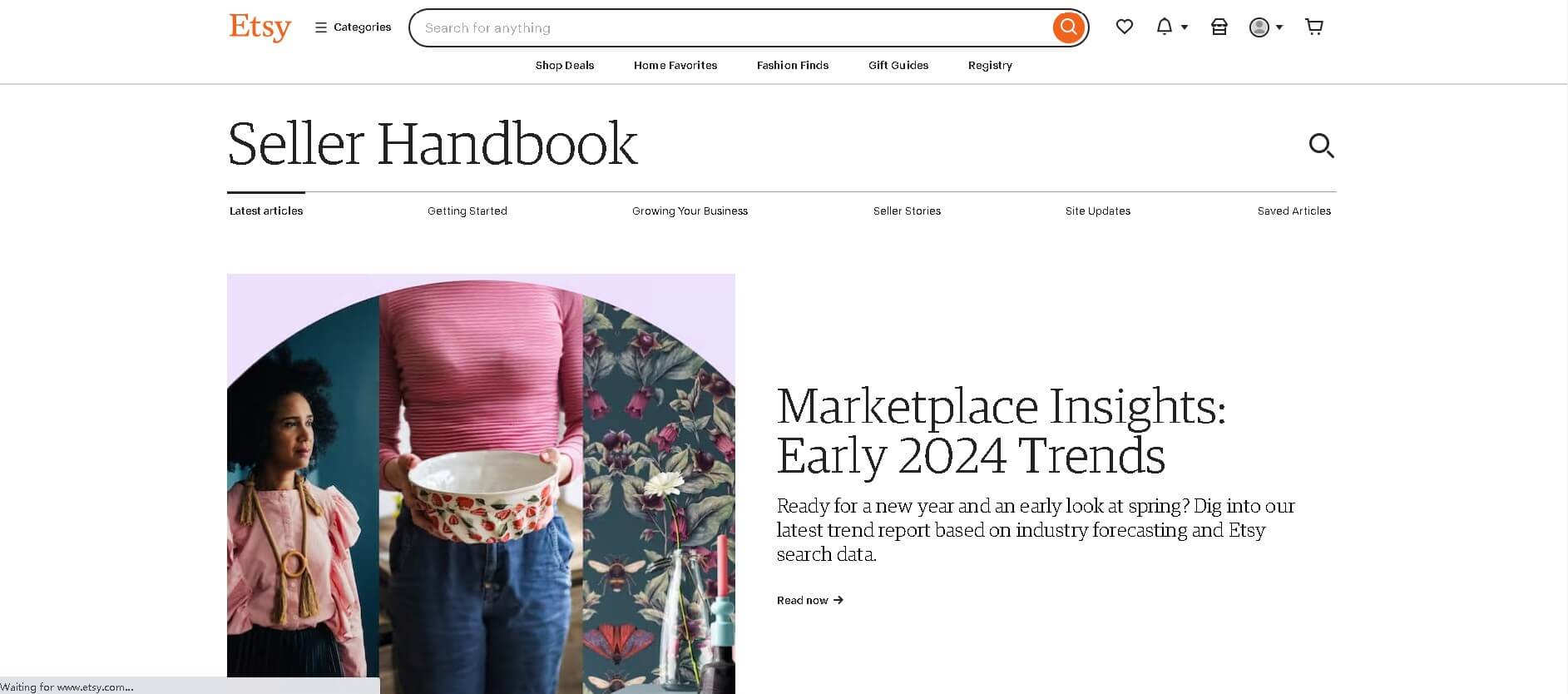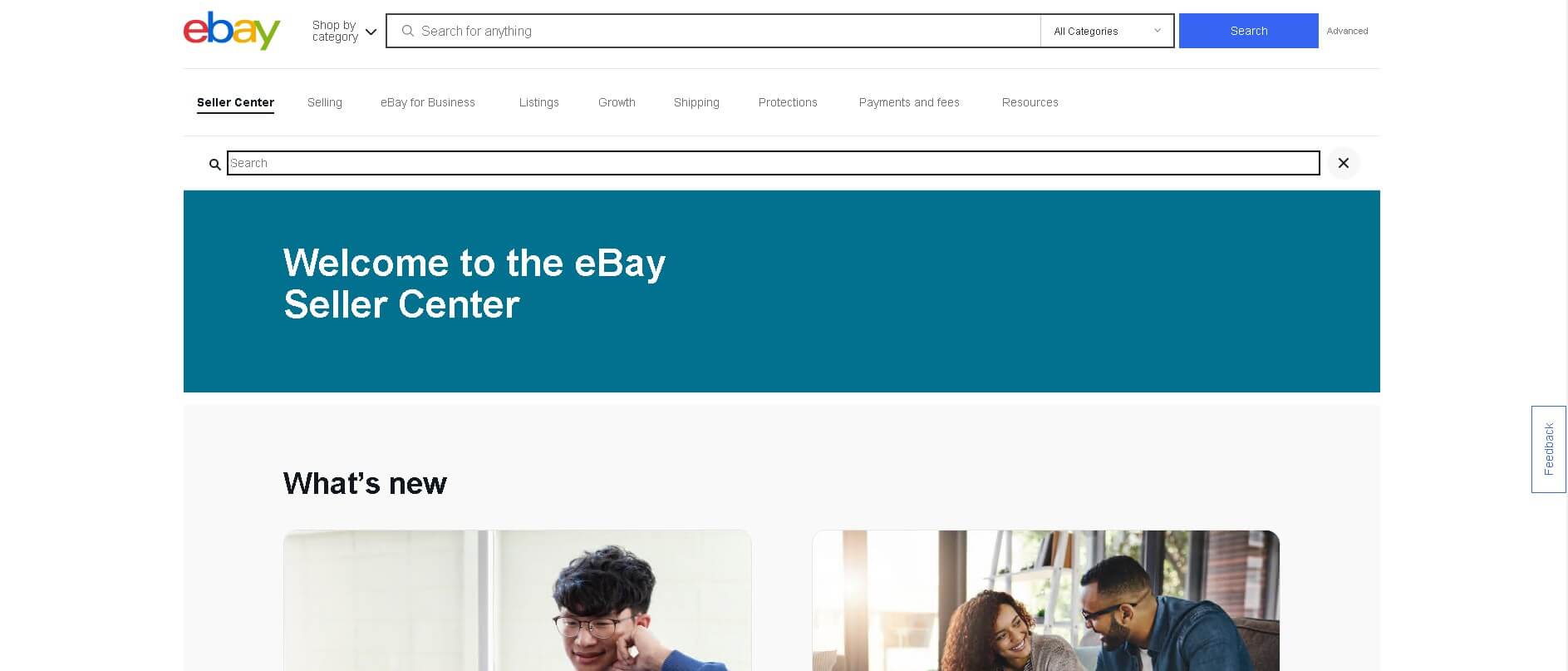
Are you struggling to decide where to sell your products online – eBay or Etsy? Choosing the wrong platform can lead to missed opportunities and wasted resources, leaving you frustrated and behind in the competitive online marketplace. In this comprehensive comparison of eBay and Etsy, we'll explore the unique advantages of each, helping you make an informed decision that aligns perfectly with your business goals.
Selling on eBay and Etsy Overview
When considering selling on eBay and Etsy, it's essential to understand the distinct nature of each platform. eBay, a vast and diverse online marketplace, offers a wide range of new and used items, catering to a global audience. It's known for its auction-style sales and fixed-price listings, making it a go-to for everything from everyday items to rare collectibles. Etsy, in contrast, is a niche marketplace specializing in handmade, vintage, and distinctive items. It attracts a community of creative sellers and buyers who value the uniqueness and craftsmanship of the products.
To support these points, here are insights from various users:
Product Type Relevance: EPIC Stack from the University of Utah emphasizes the significance of the product type when choosing between eBay and Etsy by saying, "It really depends on what you plan on SELLING, because EBAY and ETSY are very different platforms, Ebay consist of a lot of used items, whereas Etsy is only fro handmade and vintage items". eBay's broad range includes many used items, while Etsy is exclusively for handmade and vintage items.
Target Demographics: Masaraan.Z, the co-founder of FindNiche.com, highlights the different demographics catered to by each platform. Etsy is ideal for sellers of unique, handmade designs, attracting a niche audience. In contrast, eBay is suitable for a broader range of trending items, appealing to a more diverse and larger audience.
User Base and Traffic: James Cooper, based in London, said "It really depends on kinds of product and what the price of the products as well as how quickly you want to sell them. You have to figure out your niche products and budget. If you want to sell on high price you have to pay higher selling fees on Ebay. The reasons is that over 150 million active users worldwide on eBay whereas Etsy claims to have 1.5 millions sellers and 22.5 million buyers.[Source:Which is the Best Online Marketplace: Amazon, Etsy or Ebay?] For sellers, Etsy represents a far less expensive selling experience than selling on eBay. However, cost is not the only consideration for sellers. If you want to get more traffic to your store, eBay will be your best choice because millions of people visit it everyday. So all it depends on your business goals."
Seller Preferences and Experience: Kaliope Llane, the owner of PrimaTreasures.com, shares a personal preference for Etsy when selling vintage items. They cite Etsy's less aggressive haggling environment and more favorable fee structure compared to eBay, making it a preferred choice for certain types of sellers.
Fee Structure Impact: A user, RareBeautyEtsy, mentions Etsy's 15% fee for offsite searches, which can unpredictably affect the final sale amount. This fee is applied to the total sale, including shipping and handling, making it challenging for sellers to predict their earnings. This contrasts with eBay's fee structure, which may influence sellers' pricing strategies on each platform.
Market Competition: Another user, Ohwhat4567, observes that eBay tends to be more competitive price-wise, leading to lower prices there compared to Etsy. This is attributed to the different buyer markets on each platform, with Etsy buyers often willing to pay more for one-of-a-kind, handmade items.
Pricing Strategies: A seller, Voidtoform, shares their experience of pricing items higher on Etsy than on their website due to Etsy's fees. This reflects a strategy where sellers adjust their prices based on the specific marketplace's fee structure and customer base.
Pros and Cons of Selling on eBay and Etsy
eBay Pros
eBay stands out as a robust platform for print-on-demand businesses, offering a range of benefits that cater to diverse selling strategies. Its global reach is a significant advantage, providing exposure to a vast and varied audience. This aspect is crucial for expanding market presence and increasing sales opportunities.Key Pros of eBay:
Massive Audience: eBay's user base spans across continents, offering sellers access to customers from various demographics and interests.
Diverse Product Categories: The platform welcomes a wide range of products, from vintage collectibles to the latest tech gadgets. This diversity means your unique POD items have a place on eBay.
Flexible Selling Formats: Choose between auction-style or fixed-price listings to suit your sales strategy.
Seller Tools and Support: eBay provides a suite of tools and resources to help sellers manage their listings, track sales, and optimize their store performance.
eBay Cons
Transitioning from the advantages of eBay, it's equally important to consider the platform's drawbacks. The intense competition on eBay can be a significant hurdle, often leading to aggressive pricing strategies that may impact profit margins.
Key Cons of eBay:
High Competition: A crowded marketplace with numerous sellers.
Price Wars: The need for competitive pricing can affect profits.
Complex Fee Structure: Various fees can be challenging to manage.
Impact on Profits: Fees can significantly reduce profitability.
Etsy Pros
Etsy's marketplace offers distinct advantages for businesses, with its focus on distinctive, handmade, and vintage items. This niche market is ideal for POD products, attracting a dedicated customer base.
Key Pros of Etsy:
Niche Market: Specializes in offering a platform for products that are handcrafted, vintage, and artistically unique, appealing to a specific customer demographic.
Strong Community Engagement: Encourages interaction between sellers and buyers.
User-Friendly Interface: Simplifies setting up and managing an online store.
Seller Support Tools: Assists in product showcasing and business management.
Etsy Cons
While Etsy offers significant benefits for print-on-demand businesses, it's important to balance this with an understanding of its limitations. The platform's intense competition in niche categories can be a major hurdle for new sellers, and the specific customer base may limit the reach for various product types.
Key Cons of Etsy:
Intense Niche Competition: Crowded categories challenge new entrants.
Limited Audience Reach: Focused market may not suit all products.
Fee Structure: Accumulating listing, transaction, and processing fees.
Brand Limitations: Restricts scope for broader product categories.
How to Sell on Etsy?

Starting a shop on Etsy is an exciting journey into the world of online retail. This platform, celebrated for its array of handmade and vintage items, offers a unique marketplace for sellers to showcase their products. Whether you're an artist, a designer, or an entrepreneur, Etsy provides a space to connect with a community that values craftsmanship and creativity. To begin your Etsy adventure, here's a straightforward guide to get you up and running:
Sign Up and Set Up: Begin by creating an account on Etsy.com. Click on 'Sell on Etsy' and provide essential details about your business, including a unique and memorable shop name that resonates with your brand.
Product Listing: List your products with high-quality photos and detailed descriptions. Ensure your listings reflect the creativity and authenticity that Etsy's audience appreciates.
Categorization and Tagging: Accurately categorize and tag your items. This step is crucial for making your products easily discoverable by potential buyers.
Pricing Strategy: Set competitive prices for your items, keeping in mind Etsy's fee structure. It's important to price wisely to maintain profitability while being attractive to customers.
Once your shop is live, focus on building customer relationships and leveraging Etsy's marketing tools to increase your store's visibility. Regularly updating your inventory, engaging with customers through messages and reviews, and staying active in the Etsy community are essential practices for growing your Etsy business. With dedication and a strategic approach, your Etsy shop can flourish in this vibrant online marketplace.
How to Sell on eBay?

Embarking on the journey of selling on eBay can be a pivotal step for businesses looking to expand their online presence. As one of the largest global online marketplaces, eBay offers a platform where a wide variety of products can be showcased to millions of potential buyers. The process of setting up shop on eBay is straightforward, making it accessible for sellers of all levels of experience. Here's a guide to help you get started with selling on eBay:
Account Setup: Begin by creating a seller account on eBay. This involves providing necessary business information and setting up payment methods for transaction processing.
Listing Creation: Craft your product listings with attention to detail. Include clear, high-resolution images and comprehensive product descriptions. Accurate and enticing listings are key to attracting buyers.
Pricing Strategy: Decide on a pricing model. eBay offers flexibility with options for fixed-price listings or auction-style sales. Choose the one that best suits your product type and sales goals.
Shipping and Policies: Set up your shipping options and return policies. Clear and fair policies can enhance buyer trust and improve your reputation on the platform.
After setting up your eBay store, focus on customer engagement and feedback. Prompt responses to customer inquiries and addressing feedback positively can significantly impact your store's success. Regularly updating your listings and staying informed about eBay's latest features and best practices can also help in maximizing your sales potential. With a strategic approach, eBay can be a lucrative channel for expanding your business's reach.
What Are the Differences Between Etsy and eBay?
In the ever-evolving landscape of online marketplaces, grasping the distinctions between Etsy and eBay is vital for sellers aiming to broaden their market presence. Each platform presents distinct opportunities and challenges, and selecting the appropriate one can have a significant impact on your business's trajectory. To aid in this decision-making process, here's a detailed comparison table that outlines the primary differences between Etsy and eBay across various aspects:
| Aspect | Etsy | eBay |
| Consumer Base | Niche audience interested in handmade, vintage, and bespoke items. | Wide-ranging, global audience with diverse interests. |
| Product Types | Specializes in handmade, vintage, and craft supplies. | Hosts a vast array of products, including new, used, and refurbished items. |
| User Interface | Intuitive, tailored for creative businesses. | Comprehensive, emphasizing variety and searchability. |
| Features | Community-centric features like forums and teams. | Broad range of features including auctions, Buy It Now, and eBay stores. |
| Pricing and Fees | Listing fees, transaction fees, and payment processing fees. | Listing fees (varies by category), final value fees, and PayPal fees. |
| Advertising Costs | Optional Etsy Ads for better visibility. | eBay Promoted Listings for increased exposure. |
| Selling Tools | Tools for shop personalization, stats tracking, and marketing. | Advanced tools for listing, pricing advice, and sales reports. |
| Safety | Secure platform with protections for buyers and sellers. | Strong security measures with protections for buyers and sellers. |
| Shipping Method | Sellers determine their own shipping policies. | Flexible shipping options, including eBay's Global Shipping Program. |
| Help and Support | Extensive help center, community forums, and direct support. | Wide-ranging help center, community forums, and customer service. |
| Limitations | Limited to specific product categories. | Highly competitive, with potential for reduced profit margins. |
| Seller Experience | Community-focused, ideal for specialized products. | Dynamic, suitable for a diverse range of products and business models. |
This table offers an overview of the primary differences between Etsy and eBay, assisting you in choosing the platform that best suits your business goals and product types. Whether you're a small business owner, an artist, or involved in dropshipping, recognizing these differences can guide you to the platform that best aligns with your business objectives.
Which Is Better to Sell: Etsy or eBay?
Deciding whether to sell on Etsy or eBay is a pivotal choice for online sellers, each platform offering distinct advantages and challenges. Etsy, known for its focus on handmade, vintage, and unique items, provides a niche marketplace. This platform is ideal for sellers whose products align with these categories, offering a dedicated customer base that appreciates the uniqueness and craftsmanship of the items. Etsy's community-centric approach also fosters a closer connection between buyers and sellers, which can be beneficial for building brand loyalty and customer engagement.
On the other hand, eBay's vast and diverse marketplace caters to a wide range of products and consumer interests. Its global reach and flexible selling options, including auction-style and fixed-price listings, make it suitable for a variety of sellers. eBay's extensive user base can offer greater exposure for products, potentially leading to higher sales volumes. However, this also means facing stiffer competition and the need for more aggressive marketing strategies.
Conclusion
In the competitive world of online marketplaces, choosing the right platform to sell your products is a decision that can significantly impact your business. When comparing Etsy and eBay, it's important to understand their distinct features and how they align with your business goals. Both platforms cater to different types of sellers and products, each with its own set of advantages and challenges.
Ultimately, the choice between Etsy and eBay depends on the nature of your products, your business model, and your target audience. Etsy might be the better choice for specialized, artisanal products, while eBay could be more suitable for a broader range of items and larger-scale operations. Both platforms have their unique strengths, and the decision should align with your business goals and the specific needs of your products.
FAQs
Is it cheaper to sell on Etsy?
Etsy can be more cost-effective for sellers specializing in handmade, vintage, or artisanal items due to its lower listing fees and targeted niche market, which can potentially lead to higher profit margins for these specific product categories.
Does Etsy get more traffic than eBay?
eBay typically receives more traffic than Etsy due to its larger, more diverse global marketplace and wider range of product categories, appealing to a broader audience.
Is selling on Etsy worth it?
Yes, selling on Etsy can be worthwhile, especially for businesses specializing in handmade, vintage, or unique items, as it offers a dedicated niche market and a community-focused platform that can foster strong customer loyalty and brand recognition.
Is selling on eBay worth it?
Absolutely, selling on eBay can be highly beneficial, particularly for those offering a wide range of products. Its vast global reach and diverse consumer base provide significant exposure and sales potential, making it a valuable platform for various business models and product types.
What percentage does Etsy take?
Etsy charges a 5% transaction fee on the sale price (including the shipping cost set by the seller) and a 3% plus $0.25 payment processing fee. Additionally, there's a $0.20 listing fee per item.










 Global Shipping
Global Shipping




 Made in USA
Made in USA
























